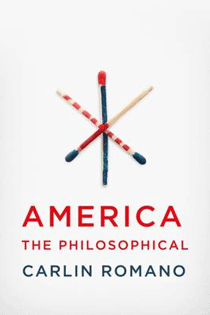By Sean Ross Meehan
Though many Americans might associate the Harvard philosopher William James with the name “pragmatism,” a smaller number would understand that pragmatism is considered to be America’s significant contribution to philosophy, and even fewer still would know that James, consistent with his pragmatic beliefs, pushed his own newly formed academic discipline toward broader and more popular conceptions of what counts as philosophy. James’s intellectual interest in what he called “popular philosophy” certainly informs this enthralling new survey of, and argument for, America’s philosophical achievement, misunderstood when not neglected or disparaged by Romano’s lights, since the beginning of the twentieth century when James is writing and teaching.
Romano deploys James’s own tensive relation between academic and popular conceptions of philosophy to great effect in the book. Thus, James makes an appearance in an early chapter introducing the “canon of American thought — Emerson, James, Dewey”; Romano extends that canon of academic philosophy to include discussion of later twentieth-century figures such as Quine, Nozick, Rawls, and Rorty. However, that chapter, titled pointedly “Great White Men and the Ivy League Cavalcade,” is succeeded by many others that focus on a diverse range of other domains for philosophical work: psychology, literary criticism, print and broadcast journalism, read by way of figures such as B.F. Skinner, Kenneth Burke, Christopher Hitchens, Bill Moyers, and, quite frankly, too many others to list here. Romano further extends the argument by giving careful consideration to a range of identities traditionally excluded from academic philosophy: in particular, African Americans and women ranging from Cornel West and Anthony Appiah to Ayn Rand and Susan Sontag. Romano concludes with an epilogue that brings the survey up to the present moment and reinforces the book’s central premise that America’s philosophical priority — “the United States as the exemplar of a paradigm of philosophy long overdue for recognition” — can be located in its more pragmatically-oriented thinking. That final chapter is titled “Obama, Philosopher in Chief.”
In places, Romano’s broad-ranging and lively survey suffers from centrifugence. While I found it fascinating to fan out over this neglected territory, and while Romano’s stylistic blending of journalistic biography and academic critical reading is highly successful, very much its own argument for a popular vision of American philosophical writing, there are moments when one must wonder: Should Romano’s interview-based reportage of Susan Sontag, no doubt drawing upon his work as critic-at-large for The Chronicle of Higher Education, be given five times the space he gives to James or Dewey or Emerson? However, Romano is also an academic philosopher (at Ursinus College), and the extended focus he gives to three case studies highlighting the problem and promise of philosophy in America, namely Richard Rorty, John Rawls, and the Greek philosopher Isocrates, provides sufficient centripetence for the argument. With Isocrates, Romano argues persuasively that America’s pragmatic and pluralistic version of philosophy has its true origins in the rhetoric of Isocrates, long disparaged as sophistry, and not in the philosophy of Plato, privileged in academic study above the “merely” rhetorical and more popular and more broadly pedagogical vision of Isocrates. I finished these three longer and somewhat unconventional explorations of philosophical thinking wanting to read an entire book on each figure. This is surely to Romano’s credit as a writer, who manages to make a 600-page book on philosophy hard to put down. And this is also to the purpose of his argument. The pragmatic characteristic of philosophical thought in America means thinking remains never quite finished. As William James would characterize this thoroughly democratic vision of philosophy, very much in Romano’s spirit: not until the last person has had his say.
Sean Ross Meehan (ΦBK, Princeton University, 1991) is Associate Professor of English and Director of Writing at Washington College. He is a resident member of the Theta of Maryland chapter of Phi Beta Kappa.




